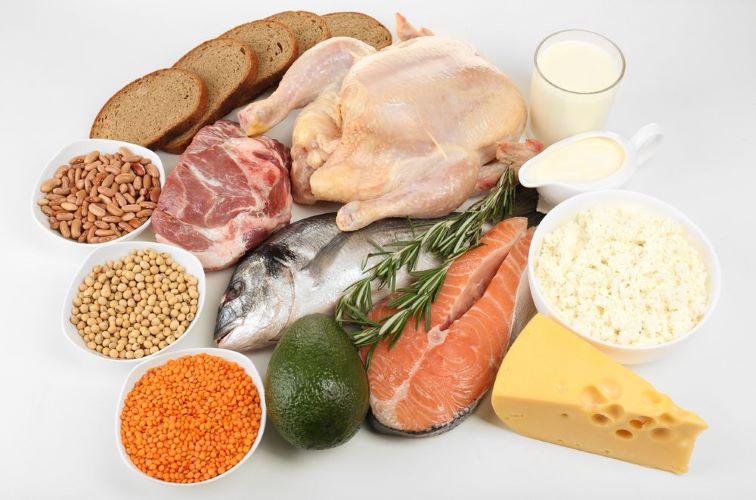Know how important is protein for your body

Dr Anuj Choudhary
Protein consumption per person in both urban (4 per cent) and rural (11 per cent) areas have decreased, says a recent case study and survey tell. Indian diets are primarily cereal-based and high in oil, with low-quality, poorly digestible grains accounting for 60 per cent of the country’s protein intake. According to a study conducted in eight Indian towns, 71 per cent of people aged 30 to 55 have weak muscles. Data show differences between states and cities; for example, Lucknow has the highest percentage of people with low muscle mass (81 per cent), while Delhi has a significantly lower percentage (64 per cent). According to the EAT Lancet Commission report, Indians eat less complex carbs, proteins, fruits, and vegetables in their diets and more simple carbohydrates. According to the Indian Consumer Market 2020, processed foods and cereals account for a large portion of monthly food budgets, with only one-third going toward items high in this ingredient.
First off, most people are ignorant of the importance of a well-balanced diet. Second, they think that the best way to feel full is to eat more rotis and rice. The adage “Feed your children more rotis, and only then will they become healthy” is widespread in North India. Thirdly, since many Indians practice vegetarianism, they do not eat protein-rich diet. And lastly, many believe it is needed only for bodybuilders.
Importance
Among the three main macronutrients, protein is one (the others being carbohydrate and fat). Humans consume a large amount of macronutrients, which are the chemical substances that give us the majority of our energy. Amino acid-based molecules called proteins are the ones that are most frequently seen in cells. The majority of the amino acids that we require for good health can be produced by our bodies, but there are nine amino acids that we are unable to create and must obtain from our diets. The nine amino acids that the human body is unable to synthesize are referred to as essential amino acids. Without each of the nine essential amino acids, humans cannot survive. Although building bones and other body tissues like muscles depends on protein, it serves many other functions as well. Practically every process in a cell involves proteins. It affects a variety of processes, including immune and metabolic responses. It serves as an energy source, helps repair damaged cells, helps make blood cells, and more.
Requirement
How much of this macronutrient do you actually need each day, though, is a subject of debate. The fact that a variety of factors influence how much protein your body needs contributes to this. Protein requirements are determined by a variety of factors, including how much energy your body requires, your age, gender, body weight, level of exercise, and health conditions. Because of this, it is challenging to calculate the precise amount of protein that a person should eat each day. You might require more protein than is generally advised if you are an athlete or regularly engage in strengthening exercises.
Sources
Although the majority of people can get the daily recommended amount of protein from food, many people use protein powder to supplement their protein intake. Foods also provide other essential nutrients both animals and plants are high in protein. Though many plants contain protein, it is important to note that many do not contain all of the necessary amino acids.
Meat, chicken, fish, eggs, milk, cheese, yoghurt, quinoa, and soybeans are all sources of complete protein, which means they contain all nine essential amino acids, according to the Food and Nutrition Board of the Institute of Medicine. Protein can be found in a wide range of plant-based foods, including fruits, legumes, seeds, nuts, whole grains, and cereals. But since plant proteins are incomplete proteins, it’s critical to understand which amino acids are present in these meals, particularly if you don’t consume meat or dairy. To guarantee that you acquire all of the necessary amino acids, you must make it a point to eat a variety of plant proteins.
As a general rule, if you obtain half of your protein from animal sources, those complete proteins imply that you don’t need to worry about the completeness of the remaining protein from plant sources. Increasing the percentage of plant sources has health benefits because it is lower in saturated fats than animal sources. You should eat a variety of foods, even if you consume foods that provide full proteins. While there are many other nutrients that are as crucial to sustaining good health, protein is an important one. Maintaining good health requires both a balanced diet and regular contact with your healthcare provider.
Some myths
Only GYM rats need protein
Everyone needs protein to be healthy and active and also to build muscle. Everyone should take high-quality protein in moderation, regardless of the type of exercise they engage in
Eating protein alone can help you lose weight
While research indicates that some proteins may help you lose weight by improving metabolism, lowering hunger, or adjusting hormone levels that govern weight, there is little evidence to support the claim that eating protein alone can help you lose weight. The problem is that protein requires more energy to digest than carbs, and because it keeps you content for longer, you eat less and lose weight as a result.
Animal-based food is the only source of complete protein
It is correct that most animal proteins have a full amino acid composition, but certain plant proteins do as well. Quinoa and buckwheat, for example, are plant-based diets that contain all nine essential amino acids.


